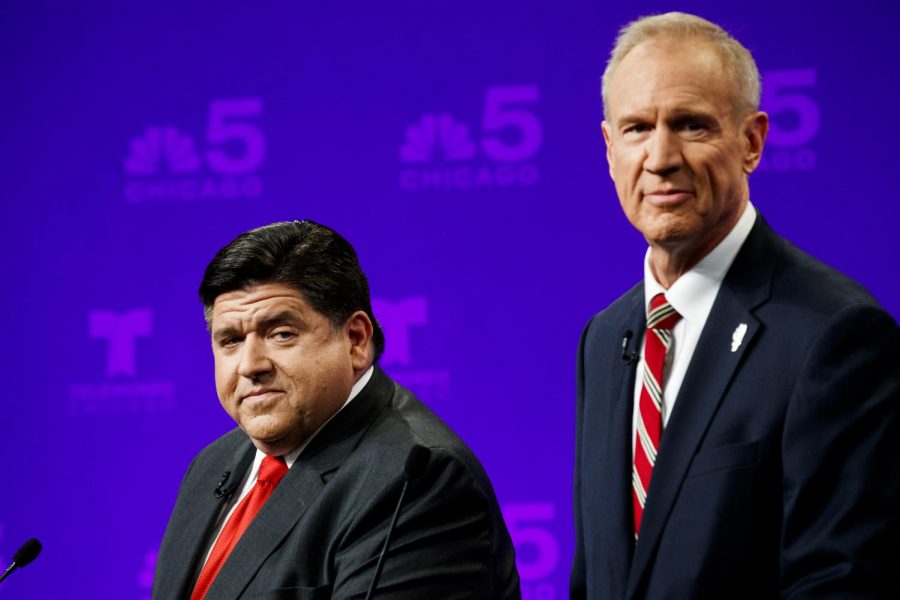Midterms should spark change in Illinois’ economic policy
Photo courtesy of Tribune News Service
Candidates for governor, Bruce Rauner and J.B. Pritzker pose mid debate. As election day approaches, economic policy will be a high-priority issue facing the people of Illinois.
November 6, 2018
It’s Nov. 6, 2018. With the midterm elections well underway, one thing that shouldn’t be forgotten as we vote is Illinois’s current economic policy.
Illinois is still facing serious fiscal and economic tragedies. Considering the 2018 Illinois gubernatorial election will directly affect the state’s economic policy in the next four years, we should take a look at two wealthy candidates, incumbent Republican Bruce Rauner and Democratic millionaire J.B. Pritzker, and what they should do to recover the Illinois economy.
David Donnelly, president and CEO of Every Voice, a political advocacy organization, writes in a 2016 New York Times column that candidates are usually so wealthy that they can afford to play politics. Of course, this is obviously “so true,” according to President Donald Trump in his United Nations speech in September.
Let’s check these two candidates of the Illinois gubernatorial election. Both of them have made millions of dollars from their businesses in the private sector, which probably implies that managing assets and even taking fiscal strategies into practice might be their shared talents.
For instance, both candidates have provided us with different, but likewise, wonderful futures. Rauner promises a $1 billion tax cut with a pension system fix, while Pritzker focuses on education and aims for public schools in our state to reduce tuition fees for in-state students.
Get The Daily Illini in your inbox!
That looks pretty promising.
Whoever wins the election, however, will probably have a difficult time as governor, at least for a while. The state’s population has been shrinking for four consecutive years, and its labor force is declining as well. In fact, Illinois’s economy is playing a lagging role to the nation in terms of growth.
Analyzing economic growth in Illinois requires deconstructing the state’s growth in real gross domestic product into its primary contributions: labor inputs and labor productivity. A quick refresher: Labor input is simply how many workers can create products and services, and labor productivity is how efficiently those workers could perform.
The production process transforms labor, capital and technology into output (real GDP). What we are worried about is that the number of Illinois workers and the efficiency of their work are both shrinking. Declining labor input can easily cancel out any improvement in productivity growth in Illinois, leaving real GDP growth unchanged or even lower than before.
Here is the data showing the urgent problem of Illinois’s economy:
| Real GDP growth | Illinois | Non-Illinois U.S. |
| 1992-2000 | 3.7% | 3.7% |
| 2001-2007 | 1.7% | 2.7% |
| 2008-2015 | 1.6% | 2.0% |
Source: Bureau of Economic Analysis
The table above is a reminder of what a former governor of Illinois said. “Illinois government did work,” says former Gov. Jim Edgar, a Republican who presided over what now looks to be the state’s heyday in the 1990s. “But then we had bad luck with a couple of governors.”
Behind low economic growth is decline of capital and labor. Due to rising individual and corporate tax rates since the early 2000s, more and more companies have been moving out, which also encourages their workers to go along with them.
It is time to change. Not just promises but actions. I believe a solid progressive tax cut reform should come first.
Improving the labor market will require sound fiscal and labor policies that assure businesses and employees that market activity will not continue to be penalized with higher taxes each year. Instead of continuously hiking taxes, lawmakers need to free Illinoisans from their enormous tax burden. A lower tax burden would stimulate investment and job creation, making the state a more attractive place for families and businesses to plant roots.
However, the only way to get lower taxes is to rein in government spending at the state and local levels. A spending cap could provide certainty about future government spending and help lawmakers avoid tax hikes to balance the budget.
As a researcher of economics, I believe in the power of the free market and strongly agree the best government is a government which governs least. The most efficient policy the government should take to recover the economy is cutting the taxes instead of fundraising for public schools. To be honest, any attempt that leads to too much control by the government on the economy is a rabbit hole.
Mr. Rauner is on the right path. The only difference is that he never actually tried his best before.
So the incumbent governor might have to keep his promises, and not fail Illinois again if he wins the election. It is necessary not only for him, but also for the future generations of Illinoisans.
Daniel is a graduate student in LAS.







